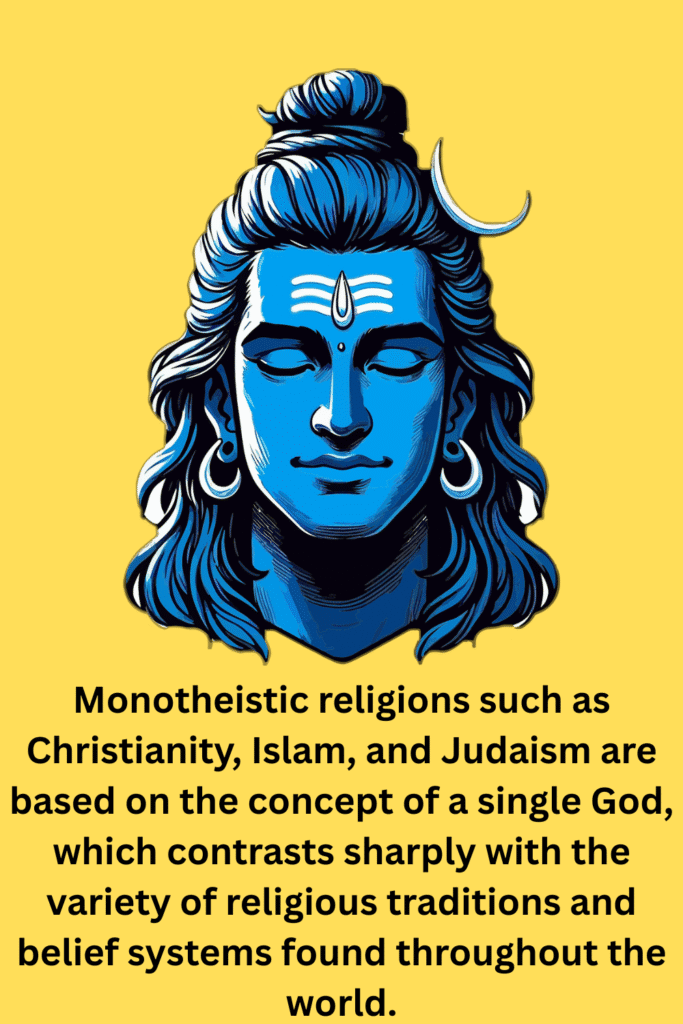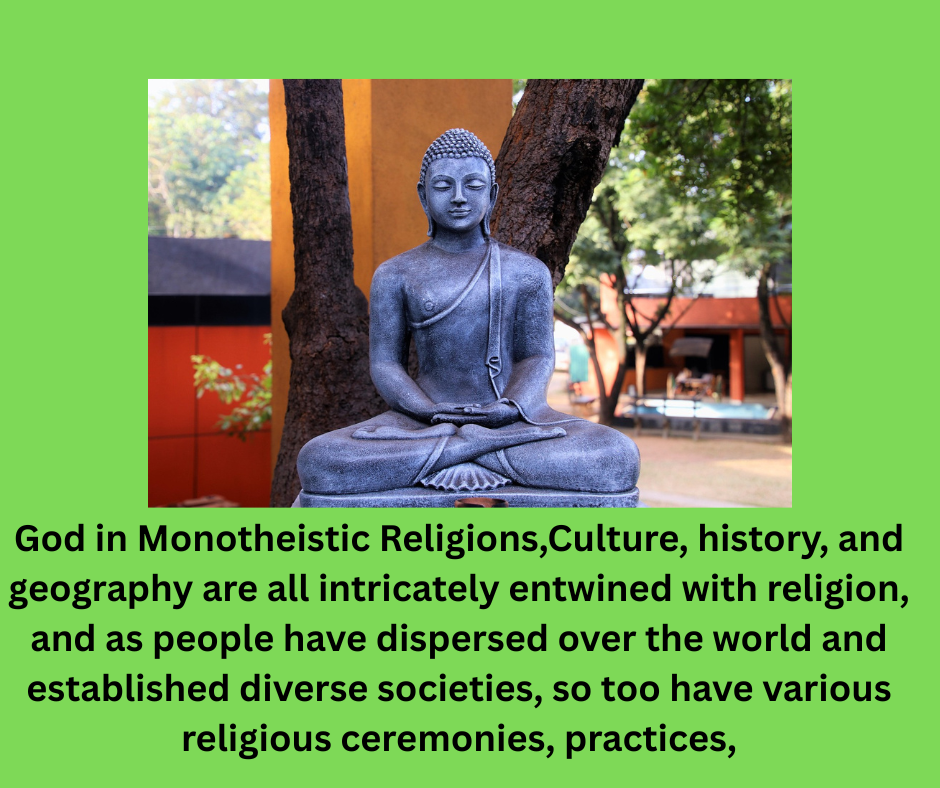God in Monotheistic Religions,Philosophers, theologians, and common people have been perplexed by the question of why there are so many different religions in the world, even if there is only one God, for millennia. Monotheistic religions such as Christianity, Islam, and Judaism are based on the concept of a single God, which contrasts sharply with the variety of religious traditions and belief systems found throughout the world.

Why do so many diverse religious traditions assert that they have the right conception of God and the way to salvation if there is only one genuine God? Important conversations concerning the nature of God, the human condition, culture, and the formation and development of religions are sparked by this query.
Table of Contents
The Evolution of Religions and Human Experience
Some of the main faiths in the world are based on the idea that there is only one, all-knowing, all-powerful God. The belief that there is only one God, who created the universe and is ultimately in charge of its order and governance, is shared by Christianity, Islam, Judaism, Zoroastrianism, and some other religions. God in Monotheistic Religions,The concepts of divine compassion, omnipotence, and omniscience are commonly linked to the belief in a single God.
For example, the belief that God is one (Tawhid) is highly valued in Islam. The idea that Allah is the only god is stated unequivocally throughout the Quran and is reiterated several times. Similar to this, the core tenet of Christianity is the existence of only one God, even if the Holy Trinity—Father, Son, and Holy Spirit—is frequently used to understand God’s character Hear, O Israel! There exists only one divine being, and he is our deity.
This statement is made in the Shoma, a major prayer of Judaism (Deuteronomy 6:4).Despite having a common belief in a single God, these religions have quite different conceptions of God, salvation, and the right way for people to relate to God. Why, therefore, are there so many distinct religions with varying views on God, salvation, and the moral code if there is only one God?
Religion’s Development and Human Experience
Understanding the nature of human experience and the evolution of religious traditions is crucial to comprehending why there are so many different faiths, even though there is only one God. God in Monotheistic Religions,Culture, history, and geography are all intricately entwined with religion, and as people have dispersed over the world and established diverse societies, so too have various religious ceremonies, practices,
And beliefs. The particular conditions of the societies in which these faiths originated frequently influenced them.
Cultural Context:
The background and cultural framework of every faith is unique.. Early people made an effort to understand the natural world, their surroundings, and their role in the universe. Their experiences and ideals were reflected in the religious systems they created.
For instance, monotheistic faiths like Judaism emerged in the context of a nomadic people seeking a personal contact with a single, transcendent God, whereas ancient Mesopotamian, Egyptians, and Greeks developed polytheistic systems to explain natural occurrences.
Geographic Isolation and Development:
The development of various religious ideas was influenced by the geographical isolation of ancient nations. God in Monotheistic Religions,The ability to communicate over long distances was lacking in early human cultures. They consequently created their own customs and beliefs based on local knowledge, which were then transmitted from one generation to the next.
Different interpretations of the same basic truths resulted from religious traditions’ frequent adaptation to their new environments as they spread and interacted with different cultures.
Human Need for Meaning:
In many respects, religion is a reaction to the need for understanding, meaning, and purpose that all people have. The nature of existence, the afterlife, and the mysteries of life have always been subjects of human inquiry.

Humans have attempted to find answers to these existential issues in a multitude of ways, which is reflected in the wide range of religious traditions. God in Monotheistic Religions,The particular responses to these concerns have changed depending on individual and group experiences, even if numerous religions may have similar themes, such as the existence of a supernatural being or the significance of moral behavior.
The Role of Revelation and Interpretation
The nature of divine revelation and how various groups of people understand it are major factors in the diversity of religions, even among those who believe in a single God. Whether it takes the shape of scripture, prophesy, or mystical experience, religious revelation is frequently interpreted differently by different people, nations, and societies. A key element in the evolution of various religions is the interpretation and transmission of these revelations.
The Character of Religious Texts:
Sacred texts, such as the Torah in Judaism, the Bible in Christianity, and the Quran in Islam, constitute the foundation of many monotheistic religions. The interpretation of these books has frequently resulted in many religious movements and divides, despite the fact that they include fundamental truths about God and how to live a good life.
For instance, the many branches of Christianity—Catholicism, Protestantism, and Eastern Orthodoxy—all profess to adhere to the teachings of Jesus Christ, but they differ in how they understand the Bible, church rituals, and theology.
Prophets and Messengers:
Prophets or messengers are thought to have been sent by God to lead humanity in religions such as Islam, Christianity, and Judaism. Every prophet delivered a message that was appropriate for the historical setting. God in Monotheistic Religions,Despite the fact that all prophets in these religions are thought to speak for the same God, their words were occasionally modified to meet the demands of the target audience.
For example, Jesus’ teachings on love, forgiveness, and salvation for all people were more important than Moses’ teachings in the Torah, which centered on regulations and covenant for the Israelites. In contrast, Islam maintains that Muhammad was the last prophet and that the Quran is the last, unchangeable word from God, completing the messages of the previous prophets.
Human Interpretation:
The formation of various religions and denominations is also heavily influenced by how people interpret religious teachings. Diverse groups of individuals may have diverse interpretations of the same revelation depending on their personal experiences, historical background, and cultural background.
Different customs, beliefs, and rituals may result from these interpretations. Two persons reading the same religious literature, for example, might interpret it quite differently, which could result in their developing various religious systems or schools of thought.
Theological Explanations for Religious Diversity
Despite the belief in a single divine person, there are numerous paths to God, which are explained by different religious traditions. God in Monotheistic Religions,In order to address the plurality of faiths, some theological perspectives propose that, although there is only one God, several religions can symbolize various routes to the same divine reality.
Theological Inclusive:
This theory, put forth by some theologians, holds that although there is only one authentic way to God (as symbolized by one religion), there may be truths in different religions that can nevertheless help people find salvation.
According to this perspective, God, in His charity, permits many religious and cultural manifestations of faith, despite the fact that they might not completely understand the truth as it is presented in a certain tradition. Some Christians, for instance, hold that while if salvation is obtained via Jesus Christ, individuals of other faiths may still be saved by God’s grace even if they do not directly adhere to Christ’s teachings.
Theological Pluralism:
From this viewpoint, every religion offers valid pathways to understanding the same spiritual reality. According to this viewpoint, various religions represent various historical and cultural manifestations of the same fundamental divine reality.
According to this perspective, there is only one God, but there are legitimate ways for people to respond to God’s existence in the universe, and no single religion has exclusive access to the truth. Those who work to promote interfaith understanding and communication frequently hold this opinion.
Divine Will:
According to many theological traditions, God’s divine design includes the existence of multiple religions. According to this perspective, God permits religious diversity so that people might be tested and have the freedom to follow their own paths. According to this perspective, human free will is essential to the formation of religions and the pursuit of truth, and God, in His wisdom, provides different pathways to encourage individual growth and understanding in spirituality.
Conclusion:
Even though there is only one God, the existence of numerous religions is a complicated and multidimensional problem. A vast range of beliefs and practices have resulted from the evolution of religions over time in response to divine revelations, cultural circumstances, and human experiences.
The subject of religious diversity frequently reveals deeper mysteries about the nature of God, human experience, and the pursuit of truth, even though each religion may assert that its conception of God is the truest.
In the end, it is possible to interpret the wide variety of religions as a reflection of people’s deep desire to comprehend the divine and discover purpose in life. God in Monotheistic Religions,The desire to love and serve others, seek peace, and pursue spiritual fulfillment are just a few of the fundamental characteristics that various religions have, even though they may have diverse solutions to the questions of God’s nature and how we should live.
The variety of religious traditions might serve as a reminder that the pursuit of God is an intensely individualized path that is influenced by our past, present, and community.